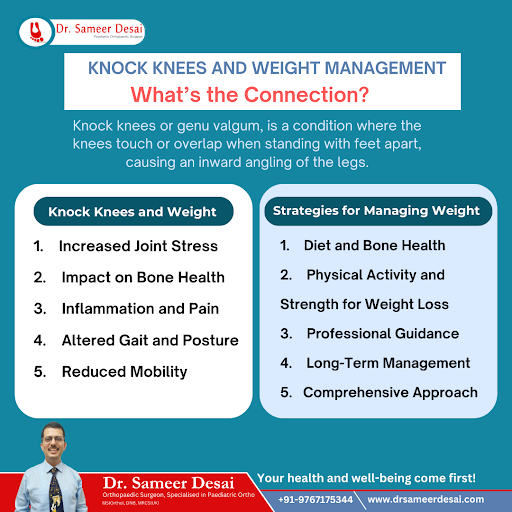Knock Knees and Causes of Weight Gain:
- Increased Joint Stress: Excess weight puts additional stress on the knee joints, which can exacerbate the misalignment associated with knock knees. This increased load may worsen the condition or accelerate its progression.
- Impact on Bone Health: Higher body weight can affect bone health and joint structure. Excess weight can lead to increased wear and tear on the knee cartilage, potentially leading to joint pain and further misalignment.
- Inflammation and Pain: Obesity is often linked to higher levels of inflammation in the body, which can contribute to joint pain and discomfort. Managing weight can help reduce inflammation and alleviate symptoms associated with knock knees.
- Altered Gait and Posture: Extra weight can change a person’s gait and posture, which might affect knee alignment. Maintaining a healthy weight helps in promoting a more balanced and efficient gait, reducing undue stress on the knees.
- Reduced Mobility: Weight gain can affect overall mobility and physical fitness, making it harder to engage in regular physical activity.
Strategies for Managing Weight:
- Physical Activity and Strength: Regular physical activity is essential for weight management and helps in strengthening the muscles around the knee. Stronger muscles provide better support and stability for the knee joint, which can aid in managing knock knees.
- Diet and Bone Health: A balanced diet that supports bone health can be beneficial. Nutrients such as calcium and vitamin D are crucial for maintaining strong bones and joints, which can support proper alignment and function.
- Professional Guidance: Consulting with healthcare professionals, including dietitians and physical therapists, can provide personalized strategies for weight management that support knee health. They can help design an appropriate exercise and nutrition plan.
- Long-Term Management: Integrating weight management into the overall treatment plan for knock knees can contribute to better long-term outcomes. Maintaining a healthy weight can help prevent further complications and support overall joint health.
- Comprehensive Approach: Addressing both weight management and knock knees simultaneously offers a holistic approach to treatment. This combined strategy can lead to improved alignment, reduced symptoms, and enhanced overall well-being.
Conclusion:
By understanding and managing the connection between knock knees and weight, individuals can take proactive steps to improve their knee health and overall quality of life.
Dr. Sameer Desai is a highly skilled knock knees specialist, providing expert care for correcting and managing this condition. Utilizing advanced diagnostic methods and personalized treatment plans, he focuses on improving knee alignment, function, and overall mobility to enhance patients\’ quality of life.

